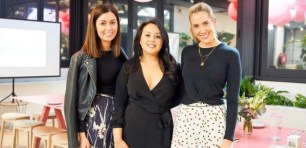
Verve Super co-founders Alex Andrews, Christina Hobbs and Zoe Lamont (L to R). Source: supplied.
If this year has taught me anything, it’s that female entrepreneurs need an inner circle. I survived 2020 by leaning on others, and I know our business is stronger for the support we gave back to women in our community.
As co-founder and CEO of Verve Super, an ethical super fund tailored for women, I was forced to re-calibrate our 2020 dreams just a few months into the year.
When COVID-19 took hold, my team rapidly shifted focus from growing the business and welcoming new members, to processing super withdrawals and doing everything we could to support our members facing financial hardship.
But my experience was nowhere near as dramatic as what some of the women in my community were facing.
My friend, Sheree Rubinstein, is the co-founder of women’s coworking space One Roof. Recently, Sheree wrote about suddenly finding herself without a business model when Melbournians were forced to work from home.
Many of the women in my community will continue to face difficulty into 2021 — women such as Karina Grey, a friend who founded Starwin to provide employment and mentorship to young Indigenous women. Karina had just launched a new community-enterprise retail outlet in Port Douglas when COVID-19 hit and revenue from tourists dried up.
The female entrepreneurs I know are resilient. Both Sheree and Karina are successfully pivoting their businesses and communities online.
Yet, we know that businesses run by women have been hit particularly hard. And with government support for business owners winding back, and little specialised support for women in the 2020 federal budget, the power of a strong support network for women has never been more important.
Research from the corporate world has taught us women are more likely to succeed in their careers if they create a supportive community of other women around them.
As it turns out, the value of a strong inner circle for women in business extends well beyond the networking benefits.
A landmark UCLA study found women in the company of friends or like-minded women release oxytocin, which actually helps counteract the day-to-day work stress most of us experience.
But finding the right inner circle when you’re an entrepreneur is often more challenging than it is for women in traditional employment.
When you’re creating a new business from scratch, paving a new path for your life, with no clear role models to follow, you need to find people who understand and believe in your dream wholeheartedly.
That’s why, at Verve, we have a support squad, where our members have free access to a financial coach, a career coach and a divorce coach. Our belief has always been that every woman should have another woman to turn to if they need support.
The Facebook group Like Minded Bitches Drinking Wine was my introduction to the powerful world of women supporting women in business. When we were preparing to launch Verve, this diverse community of more than 140,000 female entrepreneurs became an invaluable network.
This year, Verve was supported by the powerful SheEO community, an organisation founded to bridge the investment gap between businesses founded by men and women.
Monica Bradley, an executive director and investor, co-founded the Australian outpost of SheEO due to the serious challenges women-led businesses face in raising capital investment.
As she put it: “I could try and sit on more investment panels, but alone I was never going to be able to do enough.”
Now, largely thanks to Monica and her co-founder community, hundreds of Australian women are pooling their capital to invest in female-run businesses with social impact.
Other strong examples of supportive communities include The Remarkable Woman, a mentoring movement for women founded by Shivani Gopal, and Global Sisters, a social enterprise dedicated to creating business opportunities for women in Australia who have been unable to participate in sustainable mainstream employment, including older women and migrants.
As Deanne Weir, the chairwoman of Global Sisters explains: “Women have always known the power of helping other women.”
“But as we’ve tried to make inroads into existing power structures, we’ve realised that there are all sorts of institutional barriers that are still against us,” Weir said.
“Some of us have realised that we’re just going to have to try and help each other outside of these structures.”
The business case for investing in women is crystal clear. Yet, for most of us who work to build, support and invest in women, the motivation is more personal — we simply want to see other women succeed.
Finding your inner circle isn’t easy, because it requires you to find people who support your mission and share your passion. But luckily, there have never been more communities designed with women in mind.
My hope is that if you haven’t already, you too will find your support squad to help fulfil your every potential.
This article was first published by Women’s Agenda. Christina Hobbs is the winner of the Women’s Agenda 2019 Emerging Corporate Leadership Award.
Handpicked for you

How should entrepreneurs approach networking during a pandemic? How do you make new connections and soft intros when you can’t go to events and meet people by accident?



COMMENTS
SmartCompany is committed to hosting lively discussions. Help us keep the conversation useful, interesting and welcoming. We aim to publish comments quickly in the interest of promoting robust conversation, but we’re a small team and we deploy filters to protect against legal risk. Occasionally your comment may be held up while it is being reviewed, but we’re working as fast as we can to keep the conversation rolling.
The SmartCompany comment section is members-only content. Please subscribe to leave a comment.
The SmartCompany comment section is members-only content. Please login to leave a comment.